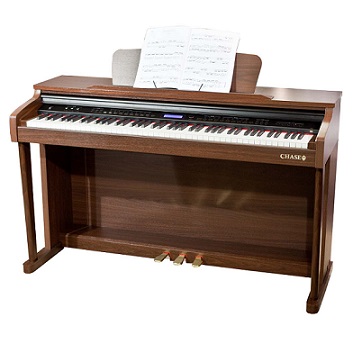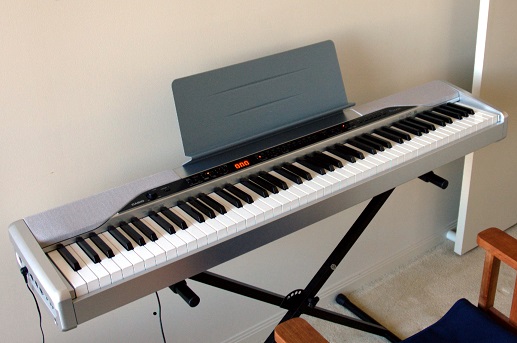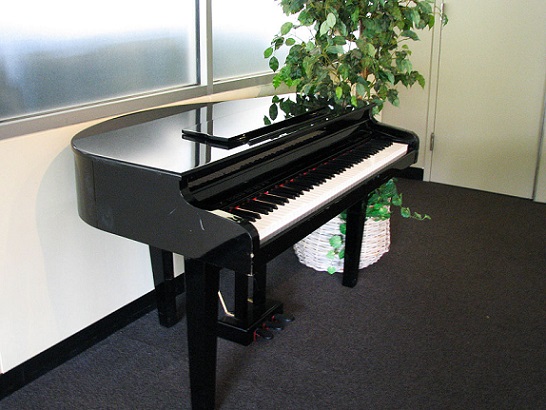There are three types of digital piano: the grand piano, upright piano, and portable piano. When purchasing a digital piano, you have to look out for:
1. The sound
The digital piano produces sound by playing pre-recorded sounds of acoustic pianos. The method and equipments used to record these tracks affect the quality of the sound. A good digital piano should sound warm and less digital, closely mimicking an acoustic piano. With that said, everyone prefers different sound quality, and it is important to choose a piano that sounds nice to you.
Apart from the general quality of the sound, you should also listen for the articulation and the decay—the start and the end—of the sound. A digital piano with better control over articulation and decay more closely resembles an acoustic piano and thus sounds more natural.
2. The number of keys
A full-sized piano consists of 88 keys. However, some digital pianos come with only 61 or fewer keys. For advanced piano players, a piano with 88 keys is required. Therefore, if you’re a beginner who’s serious about learning the piano, it is advisable for you to get a full-sized piano.
3. Polyphony
Polyphony refers to the maximum number of sounds that a piano can produce at any time. This means that a piano with 32-note polyphony can produce up to 32 notes at once. Intermediate players should get pianos with at least 64-note polyphony. For advanced pianists, getting a piano with 128-note polyphony or more is desirable.
One question that I frequently hear is this: a full-sized piano has 88 keys, why should there be a piano with 128-note polyphony? This is because the use of the sustain pedal allows the piano to produce many notes at once. If you’re playing a long string of notes while using the sustain pedal, the piano could be producing more than 88 notes at some point.
4. The touch response of the keys
Touch-sensitivity
Touch-sensitivity refers to how responsive a piano is when you play a key with different amounts of strength. The keyboard is able to sense the velocity with which you play the key and correspondingly produces a sound of appropriate volume. A touch-sensitive piano gives you better control over the music’s dynamics, which allows you to play more expressively.
Weight of the keys
A digital piano can have keys without added weight, semi-weighted keys, or fully-weighted keys. Manufacturers introduce weighted keys to mimic the heaviness of acoustic piano keys. A digital piano with fully-weighted keys is considered the best option, because its keys most closely resemble those of an acoustic piano. It is a good option for pianists who are planning to buy an acoustic piano eventually.
5. Extra features
Other Instrument sounds
A digital piano has the capability to produce sounds of almost any instruments, ranging from a saxophone to a choir. While this isn’t essential, picking a piano with a large number of instrumental tracks will allow you to choose the sound that suits your music best.
Learning tools
Some common learning tools include:
- Keys that light up for you to follow
- Dual-mode, in which the keyboard splits into two sections so that you can play in the same octave as your teacher or friend
- Built-in metronome
These features act as learning aids, which are especially useful for beginners. However, not all learning tools are useful. Thus, it is important to find a piano with extra features that suit you.
6. Brand
The brand of a digital piano is a good gauge of its sound quality and durability. Time and again, industry experts have recommended certain brands of digital piano because of their reliability. Here’s a short list of reputable brands:
Should I buy a second-hand digital piano?
A second-hand digital piano can be a good option because it is cheaper. In fact, digital pianos depreciate quite quickly because many new, more advanced models are released every year. Besides the price factor, digital pianos aren’t as fragile as their acoustic counterparts, and repairs aren’t frequently required, even for second-hand pianos. Second-hand pianos can be found in many music stores, private retailers, eBay, and other online ads.
However, buying a second-hand digital piano can be risky. Usually, they don’t come with any warranty. Any repairs will add to your costs. Furthermore, you have to ensure that the piano is in good working condition. It only takes one damaged key to ruin your playing experience. If possible, try playing the piano and try all its features before you purchase it. Lastly, do your research on new models of digital pianos to ascertain that the second-hand piano of your choice is reasonably-priced.
Final Tips
1. Try playing the piano before buying it
While it is convenient to purchase pianos online, it is highly recommended that you make a trip to the shop and try the instrument. This will give you a better idea of the sound and touch response of the piano. If possible, bring someone with you. It’s always good to have an extra pair of ears.
2. Look for reviews
It might be difficult to trust the salesperson or retailer, so do some research and look for piano reviews. Find out what other people think about the piano. You may identify certain flaws or discover good alternative models in the process.
3. Lower-tier pianos
It isn’t always a bad thing to buy a lower-tier piano. Many people who aren’t sure about sustaining this hobby for long choose to start of with a cheaper model. You can always upgrade to a better piano later.
Conclusion
Choosing a piano is difficult because there isn’t a one-size-fits-all piano. What’s important is that you weigh all the pros and cons to choose the piano that suits you best. Once you’ve made your purchase, be sure to take good care and make good use of it. I wish you all the best on your music journey!
Also published on Medium.



